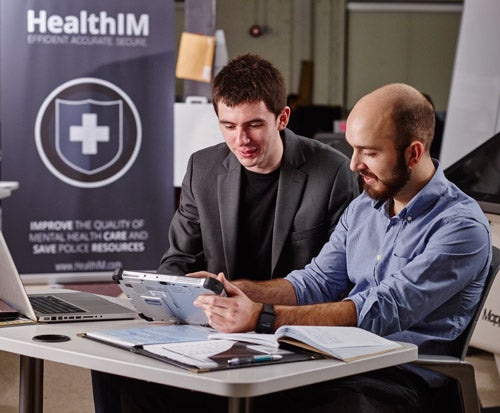
People in a mental health crisis get treatment faster with new tech
Police are using HealthIM’s software to assess risk at the scene and to save time by alerting emergency rooms to incoming patients in crisis

Police are using HealthIM’s software to assess risk at the scene and to save time by alerting emergency rooms to incoming patients in crisis
By Sabrina Hutchison Office of ResearchPolice officers regularly encounter people in crisis and for those suffering a mental health crisis, they need help immediately.
A new software tool that guides police officers through on-scene risk assessments to connect people in crisis with necessary health care and community services could make a big difference for police and people in need.

HealthIM co-founders, Daniel MacKenzie and Daniel Pearson Hirdes, work on developing new software tool for police responding to people in crisis
“Health IM is not meant to replace experienced officers making difficult decisions in the field,” says Daniel Pearson Hirdes, CEO of the startup HealthIM and University of Waterloo alumnus. “It provides support, reasoning, and justification for their decisions and connects all points of the mental health strategy in order to get people the appropriate help.”
Hirdes and HealthIM co-founder, Daniel MacKenzie, have personal experience with how a mental health crisis can impact a person and their loved ones. Friends since high school, Hirdes and MacKenzie decided to explore their shared passion for helping people with mental health needs during their second year at the University of Waterloo.
This led to the development of HealthIM, a software program comprised of clinically validated questions and algorithms. A $60,000 AC JumpStart – University of Waterloo award helped Hirdes and MacKenzie with research, development, and marketing needed to launch HealthIM. Funded by FedDev Ontario and the University of Waterloo, AC JumpStart is delivered through the Accelerator Centre and provides early stage technology startups with the seed capital, mentorship, and market-readiness tools needed to build a business in today’s knowledge economy.
Based on interRAI research by Ron Hoffman, the HealthIM program works on hardware in police cruisers and hospitals. If a police officer determines hospital intervention is warranted, the assessment can be sent via a secure cloud service based in Canada. Having this information in advance allows the hospital to triage the patient before they arrive so they can be taken directly to the mental health unit, saving hours of police time.
If hospital intervention isn’t needed, the police officer can send the assessment to other community services, such as counselling centres. These services will then work directly with the patient and, hopefully, prevent future crisis situations by proactively providing people with the help needed.
Officially launched in November 2015, Hirdes hopes to have 1200 officers using HealthIM by this summer, including Brantford Police Services who have been using the program since October 2015.
“We’re trying to connect as many polices services as possible so everyone is speaking the same language,” says Hirdes. “Lots of police services have great crisis response programs and by connecting them, using HealthIM as an anchor point, we can create a standardized language between police services which will further benefit people needing their help.”
While expanding the program to police services across Ontario is their focus this year, the team at HealthIM are also thinking about future possibilities, such as using the software to screen for post-traumatic stress disorder in the military, or mental health assessments for those using homeless shelters.

Read more
Redefining capstone learning by bringing students, faculty and community partners together to tackle real-world challenges

Read more
Here are the people and events behind some of this year’s most compelling Waterloo stories

Read more
From pumpkin patches to haunting nightmares, a proud Waterloo alum shares how Snyder’s Farm evolved into one of Ontario’s final destinations for Halloween
The University of Waterloo acknowledges that much of our work takes place on the traditional territory of the Neutral, Anishinaabeg, and Haudenosaunee peoples. Our main campus is situated on the Haldimand Tract, the land granted to the Six Nations that includes six miles on each side of the Grand River. Our active work toward reconciliation takes place across our campuses through research, learning, teaching, and community building, and is co-ordinated within the Office of Indigenous Relations.